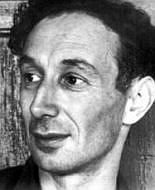
Sir Alfred Jules "Freddie" Ayer, usually cited as A. J. Ayer, was an English philosopher known for his promotion of logical positivism, particularly in his books Language, Truth, and Logic (1936) and The Problem of Knowledge (1956).

David Hume was a Scottish Enlightenment philosopher, historian, economist, librarian, and essayist, who is best known today for his highly influential system of philosophical empiricism, skepticism, and naturalism. Beginning with A Treatise of Human Nature (1739–40), Hume strove to create a naturalistic science of man that examined the psychological basis of human nature. Hume argued against the existence of innate ideas, positing that all human knowledge derives solely from experience. This places him with Francis Bacon, Thomas Hobbes, John Locke, and George Berkeley as an empiricist.

George Edward Moore was an English philosopher, who with Bertrand Russell, Ludwig Wittgenstein and earlier Gottlob Frege was among the founders of analytic philosophy. He and Russell led the turn from idealism in British philosophy and became known for advocating common-sense concepts and contributing to ethics, epistemology and metaphysics. He was said to have an "exceptional personality and moral character". Ray Monk later dubbed him "the most revered philosopher of his era".
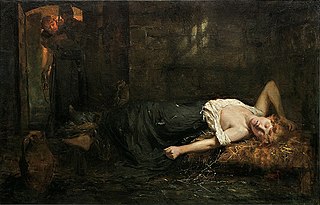
Skepticism, also spelled scepticism, is a questioning attitude or doubt toward knowledge claims that are seen as mere belief or dogma. For example, if a person is skeptical about claims made by their government about an ongoing war then the person doubts that these claims are accurate. In such cases, skeptics normally recommend not disbelief but suspension of belief, i.e. maintaining a neutral attitude that neither affirms nor denies the claim. This attitude is often motivated by the impression that the available evidence is insufficient to support the claim. Formally, skepticism is a topic of interest in philosophy, particularly epistemology. More informally, skepticism as an expression of questioning or doubt can be applied to any topic, such as politics, religion, or pseudoscience. It is often applied within restricted domains, such as morality, atheism, or the supernatural. Some theorists distinguish "good" or moderate skepticism, which seeks strong evidence before accepting a position, from "bad" or radical skepticism, which wants to suspend judgment indefinitely.

Thomas Reid was a religiously trained Scottish philosopher best known for his philosophical method, his theory of perception, and its wide implications on epistemology, and as the developer and defender of an agent-causal theory of free will. He also focused extensively on ethics, theory of action and philosophy of mind.

Nicolas Malebranche was a French Oratorian Catholic priest and rationalist philosopher. In his works, he sought to synthesize the thought of St. Augustine and Descartes, in order to demonstrate the active role of God in every aspect of the world. Malebranche is best known for his doctrines of vision in God, occasionalism and ontologism.
Théodore Simon Jouffroy was a French philosopher.
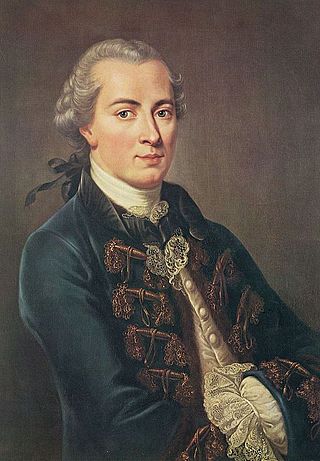
Friedrich Heinrich Jacobi was an influential German philosopher, literary figure, and socialite.
Philosophical skepticism is a family of philosophical views that question the possibility of knowledge. It differs from other forms of skepticism in that it even rejects very plausible knowledge claims that belong to basic common sense. Philosophical skeptics are often classified into two general categories: Those who deny all possibility of knowledge, and those who advocate for the suspension of judgment due to the inadequacy of evidence. This distinction is modeled after the differences between the Academic skeptics and the Pyrrhonian skeptics in ancient Greek philosophy. In the latter sense, skepticism is understood as a way of life that helps the practitioner achieve inner peace. Some types of philosophical skepticism reject all forms of knowledge while others limit this rejection to certain fields, for example, to knowledge about moral doctrines or about the external world. Some theorists criticize philosophical skepticism based on the claim that it is a self-refuting idea since its proponents seem to claim to know that there is no knowledge. Other objections focus on its implausibility and distance from regular life.

John Henry McDowell, FBA is a South African philosopher, formerly a fellow of University College, Oxford, and now university professor at the University of Pittsburgh. Although he has written on metaphysics, epistemology, ancient philosophy, nature, and meta-ethics, McDowell's most influential work has been in the philosophy of mind and philosophy of language. McDowell was one of three recipients of the 2010 Andrew W. Mellon Foundation's Distinguished Achievement Award, and is a Fellow of both the American Academy of Arts & Sciences and the British Academy.
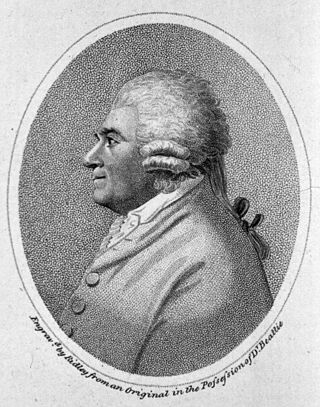
James Beattie was a Scottish poet, moralist, and philosopher.
Philosophical realism is usually not treated as a position of its own but as a stance towards other subject matters. Realism about a certain kind of thing is the thesis that this kind of thing has mind-independent existence, i.e. that it is not just a mere appearance in the eye of the beholder. This includes a number of positions within epistemology and metaphysics which express that a given thing instead exists independently of knowledge, thought, or understanding. This can apply to items such as the physical world, the past and future, other minds, and the self, though may also apply less directly to things such as universals, mathematical truths, moral truths, and thought itself. However, realism may also include various positions which instead reject metaphysical treatments of reality entirely.
Pyrrhonism is an Ancient Greek school of philosophical skepticism which rejects dogma and advocates the suspension of judgement over the truth of all beliefs. It was founded by Aenesidemus in the first century BCE, and said to have been inspired by the teachings of Pyrrho and Timon of Phlius in the fourth century BCE. Pyrrhonism is best known today through the surviving works of Sextus Empiricus, writing in the late second century or early third century CE. The publication of Sextus' works in the Renaissance ignited a revival of interest in Skepticism and played a major role in Reformation thought and the development of early modern philosophy.

Philip Stuart Kitcher is a British philosopher who is John Dewey Professor Emeritus of philosophy at Columbia University. He specialises in the philosophy of science, the philosophy of biology, the philosophy of mathematics, the philosophy of literature, and more recently pragmatism.

George Campbell FRSE was a Scottish Enlightenment philosopher, minister, and professor of divinity. Campbell was primarily interested in rhetoric, since he believed that its study would enable his students to become better preachers. He became a philosopher of rhetoric because he took it that the philosophical changes of the Age of Enlightenment would have implications for rhetoric.
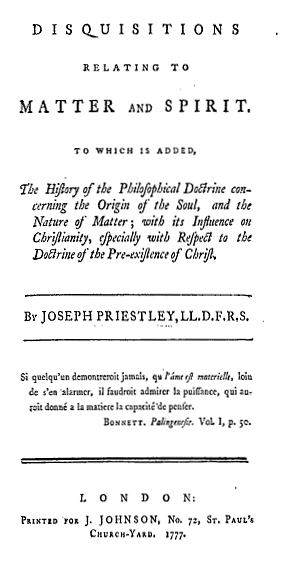
Disquisitions relating to Matter and Spirit (1777) is a major work of metaphysics written by eighteenth-century British polymath Joseph Priestley and published by Joseph Johnson.

Barry Stroud was a Canadian philosopher and professor at the University of California, Berkeley. Known especially for his work on philosophical skepticism, he wrote about David Hume, Ludwig Wittgenstein, the metaphysics of color, and many other topics.
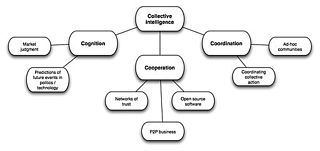
Common sense is sound, practical judgment concerning everyday matters, or a basic ability to perceive, understand, and judge in a manner that is shared by nearly all people.

Scottish common sense realism, also known as the Scottish school of common sense, is a realist school of philosophy that originated in the ideas of Scottish philosophers Thomas Reid, Adam Ferguson, James Beattie, and Dugald Stewart during the 18th-century Scottish Enlightenment. Reid emphasized man's innate ability to perceive common ideas and that this process is inherent in and interdependent with judgement. Common sense, therefore, is the foundation of philosophical inquiry. Though best remembered for its opposition to the pervasive philosophy of David Hume, Scottish common sense philosophy is influential and evident in the works of Thomas Jefferson and late 18th-century American politics.

Scottish philosophy is a philosophical tradition created by philosophers belonging to Scottish universities. Although many philosophers such as Francis Hutcheson, David Hume, Thomas Reid, and Adam Smith are familiar to almost all philosophers it was not until the 19th century that the notion of 'Scottish philosophy' became recognized and held to high regard on an international level. In the 20th century, however, this tradition declined as Scottish educated philosophers left for England.















